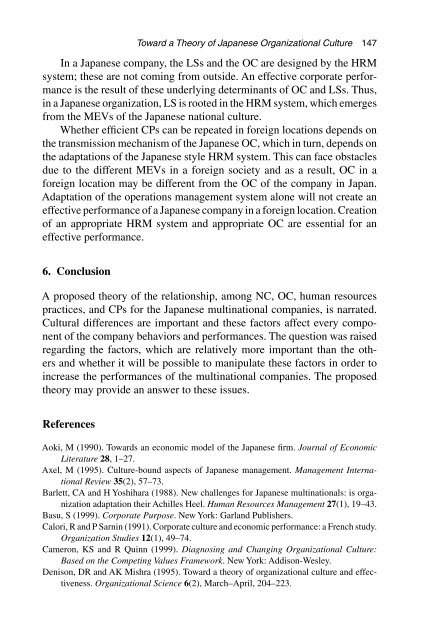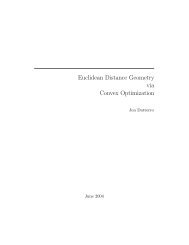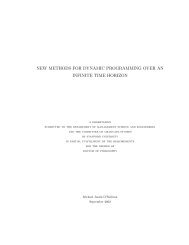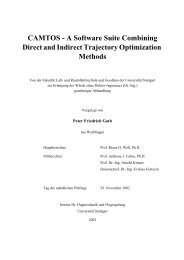Economic Models - Convex Optimization
Economic Models - Convex Optimization
Economic Models - Convex Optimization
You also want an ePaper? Increase the reach of your titles
YUMPU automatically turns print PDFs into web optimized ePapers that Google loves.
Toward a Theory of Japanese Organizational Culture 147<br />
In a Japanese company, the LSs and the OC are designed by the HRM<br />
system; these are not coming from outside. An effective corporate performance<br />
is the result of these underlying determinants of OC and LSs. Thus,<br />
in a Japanese organization, LS is rooted in the HRM system, which emerges<br />
from the MEVs of the Japanese national culture.<br />
Whether efficient CPs can be repeated in foreign locations depends on<br />
the transmission mechanism of the Japanese OC, which in turn, depends on<br />
the adaptations of the Japanese style HRM system. This can face obstacles<br />
due to the different MEVs in a foreign society and as a result, OC in a<br />
foreign location may be different from the OC of the company in Japan.<br />
Adaptation of the operations management system alone will not create an<br />
effective performance of a Japanese company in a foreign location. Creation<br />
of an appropriate HRM system and appropriate OC are essential for an<br />
effective performance.<br />
6. Conclusion<br />
A proposed theory of the relationship, among NC, OC, human resources<br />
practices, and CPs for the Japanese multinational companies, is narrated.<br />
Cultural differences are important and these factors affect every component<br />
of the company behaviors and performances. The question was raised<br />
regarding the factors, which are relatively more important than the others<br />
and whether it will be possible to manipulate these factors in order to<br />
increase the performances of the multinational companies. The proposed<br />
theory may provide an answer to these issues.<br />
References<br />
Aoki, M (1990). Towards an economic model of the Japanese firm. Journal of <strong>Economic</strong><br />
Literature 28, 1–27.<br />
Axel, M (1995). Culture-bound aspects of Japanese management. Management International<br />
Review 35(2), 57–73.<br />
Barlett, CA and H Yoshihara (1988). New challenges for Japanese multinationals: is organization<br />
adaptation their Achilles Heel. Human Resources Management 27(1), 19–43.<br />
Basu, S (1999). Corporate Purpose. New York: Garland Publishers.<br />
Calori, R and P Sarnin (1991). Corporate culture and economic performance: a French study.<br />
Organization Studies 12(1), 49–74.<br />
Cameron, KS and R Quinn (1999). Diagnosing and Changing Organizational Culture:<br />
Based on the Competing Values Framework. New York: Addison-Wesley.<br />
Denison, DR and AK Mishra (1995). Toward a theory of organizational culture and effectiveness.<br />
Organizational Science 6(2), March–April, 204–223.
















